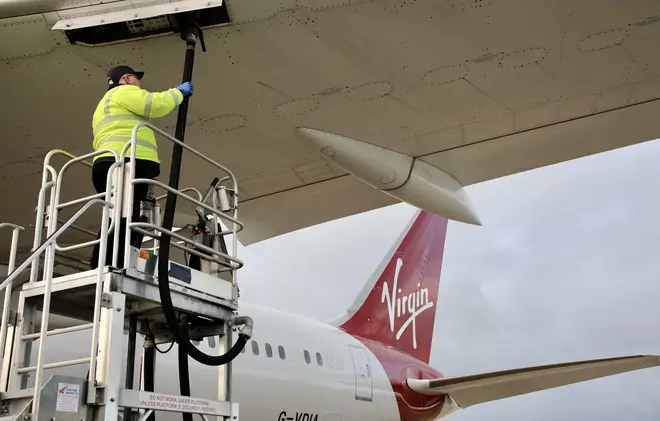
Henry Riley 7pm - 10pm
28 November 2023, 08:33 | Updated: 28 November 2023, 08:37

The first transatlantic flight by a large passenger aircraft powered in part by cooking oil will take off later from Heathrow.
Virgin Atlantic will operate the flight to New York JFK with a Boeing 787 Dreamliner aircraft on Tuesday.
So-called sustainable aviation fuels (SAF) will power the flight, the fuel can be made from a variety of sources, including crops, household waste and cooking oils.
Virgin founder Sir Richard Branson, Mr Harper and Virgin Atlantic chief executive Shai Weiss will be among the passengers on the flight, which is not carrying fare-paying travellers.
The Transport Secretary said: "Today's 100% SAF-powered flight shows how we can decarbonise transport both now and in the future, cutting lifecycle emissions by 70% and inspiring the next generation of solutions.
"This Government has backed today's flight to take off and we will continue to support the UK's emerging SAF industry as it creates jobs, grows the economy and gets us to jet zero."
Sir Richard said: "The world will always assume something can't be done, until you do it.
"The spirit of innovation is getting out there and trying to prove that we can do things better for everyone's benefit.
"Virgin Atlantic has been challenging the status quo and pushing the aviation industry to never settle and do better since 1984."
The Civil Aviation Authority reviewed various aspects of the flight before granting an operating permit, including analysing ground tests with an engine running on 100% SAF.
Virgin Atlantic was awarded up to £1 million by the Government in December last year to plan and operate the flight to demonstrate the effectiveness of SAF.
SAF is seen as vital to reduce the aviation industry's carbon emissions but is currently much more expensive to produce than conventional jet fuel.
It makes up only about 0.1% of aviation fuel used globally.
SAF is made from sustainable sources such as agricultural waste and used cooking oil, meaning its production involves using about 70% less carbon.
It can be used in jet engines to a maximum blend of 50% with kerosene without the need for any modifications.
US company Gulfstream Aerospace operated the first transatlantic flight powered by 100% SAF earlier this month using a business jet.
Virgin Atlantic's flight will be the first of its kind by a large passenger aircraft.
Mr Weiss said: "Getting to this point has been more than a year in the making and taken radical collaboration across our consortium partners and Government.
"We're committed to using 10% SAF by 2030, but to get there we need the Government to support the creation of a UK SAF industry.
"We know that if we can make it, we can fly it."
Campaign group the Aviation Environment Federation (AEF) has hit back at the Department for Transport's claim the technology will "make guilt-free flying a reality".
The group's policy director Cait Hewitt said: "The idea that this flight somehow gets us closer to guilt-free flying is a joke.
"SAF represent around 0.1% of aviation fuel globally and will be very hard to scale up sustainably."
She accused the aviation sector of being "misleading" over the impact of using SAF on carbon emissions.
Ms Hewitt added: "Hopefully, we'll have better technological solutions in future but, for now, the only way to cut CO2 from aviation is to fly less."
Under the DfT's SAF mandate, at least 10% of fuel used by airlines in the UK must be made from sustainable feedstocks by 2030.
Without UK SAF production, meeting the mandate will rely heavily on imports.
Mr Harper recently insisted the UK is "on track" to meet its target of having at least five commercial SAF plants in construction by 2025.